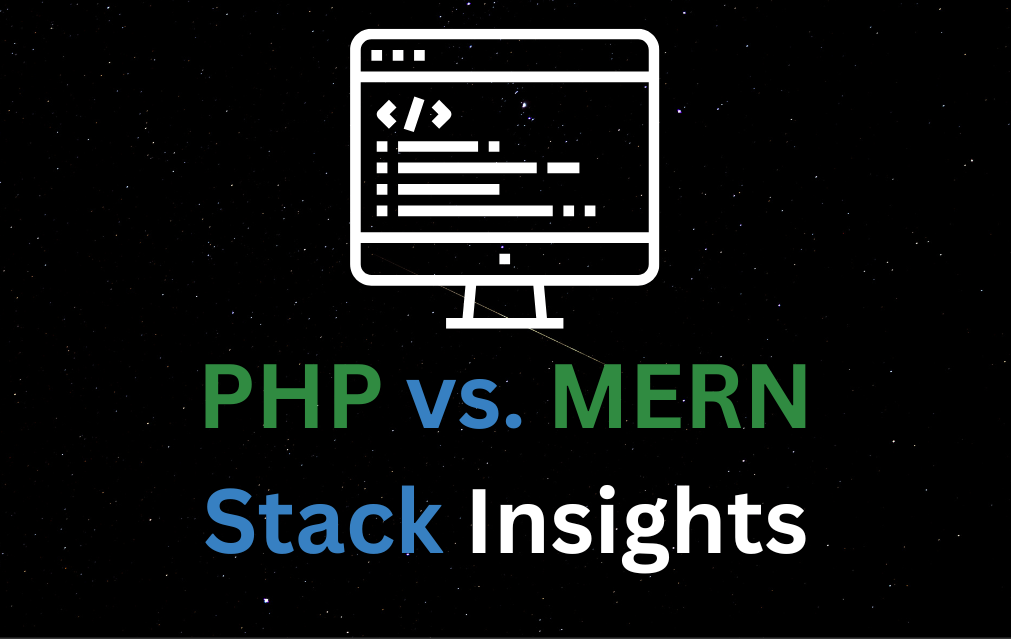PHP vs MERN Stack – Introduction
When building a web application, choosing the right technology stack is crucial. PHP and MERN (MongoDB, Express.js, React, Node.js) are two popular choices, each with its strengths and ideal use cases. This article compares PHP and MERN Stack to help you decide which one suits your project best.
1. Understanding PHP
What is PHP?
PHP (Hypertext Preprocessor) is a server-side scripting language primarily used for web development. It powers 80% of websites worldwide, including WordPress, Facebook (legacy systems), and Wikipedia.
Pros of PHP:
✔ Easy to Learn & Use: Simple syntax and wide documentation.
✔ Strong Backend Capabilities: Well-suited for handling server-side operations and database interactions.
✔ Huge Ecosystem: Works well with MySQL, Apache, and popular CMS platforms like WordPress.
✔ Scalable & Secure: With frameworks like Laravel, PHP applications can be highly scalable and secure.
Cons of PHP:
✖ Not Ideal for Full-Stack Applications: Primarily a backend language, requiring additional frontend technologies.
✖ Slower Than JavaScript-Based Alternatives: Traditional PHP apps may not perform as efficiently as modern JavaScript stacks.
Best Use Cases for PHP:
- Content Management Systems (CMS)
- E-commerce websites (WooCommerce, Magento)
- Custom backend applications
2. Understanding MERN Stack
What is MERN?
MERN Stack is a JavaScript-based web development stack that includes:
- MongoDB (NoSQL database)
- Express.js (Backend framework)
- React.js (Frontend library)
- Node.js (Runtime for JavaScript)
Pros of MERN Stack:
✔ Full-Stack Development: Enables seamless frontend and backend development using JavaScript.
✔ High Performance & Scalability: Handles real-time applications efficiently.
✔ Modern UI Capabilities: React provides dynamic, fast, and interactive user interfaces.
✔ API-Friendly: Ideal for building RESTful and GraphQL APIs.
Cons of MERN Stack:
✖ Learning Curve: Requires familiarity with JavaScript, React, and backend technologies.
✖ More Complex Setup: Compared to PHP, setting up a MERN project involves multiple components.
Best Use Cases for MERN:
- Single Page Applications (SPAs)
- Real-time applications (Chat apps, streaming services)
- Scalable web applications requiring API-driven architecture
3. PHP vs. MERN Stack: A Feature Comparison
| Feature | PHP | MERN Stack |
|---|---|---|
| Language | PHP | JavaScript (Full Stack) |
| Database | MySQL/PostgreSQL | MongoDB (NoSQL) |
| Frontend | Requires HTML/CSS/JS | React.js |
| Backend | PHP (Laravel, CodeIgniter) | Node.js (Express.js) |
| Performance | Slower than JavaScript stacks | Fast & Scalable |
| Ease of Learning | Easier for beginners | Steeper learning curve |
| Best For | CMS, Blogs, E-commerce | SPAs, APIs, Real-Time Apps |
4. Which One Should You Choose?
✅ Choose PHP if:
- You need a CMS or a traditional web application.
- You prefer a simpler and well-documented backend language.
- You want to work with MySQL-based databases.
✅ Choose MERN Stack if:
- You’re building a full-stack JavaScript-based web app.
- You require a dynamic, fast, and modern UI.
- You need real-time capabilities and scalability.
Conclusion
Both PHP and MERN Stack have their strengths, and the right choice depends on your project requirements. If you’re working on content-heavy sites like blogs or e-commerce platforms, PHP is a solid choice. However, if you want a high-performance, real-time, and API-driven application, MERN Stack is the way to go.
Note: All Of Our Articles Are Written By Artificial Intelligence And Reviewed By Researchers.
